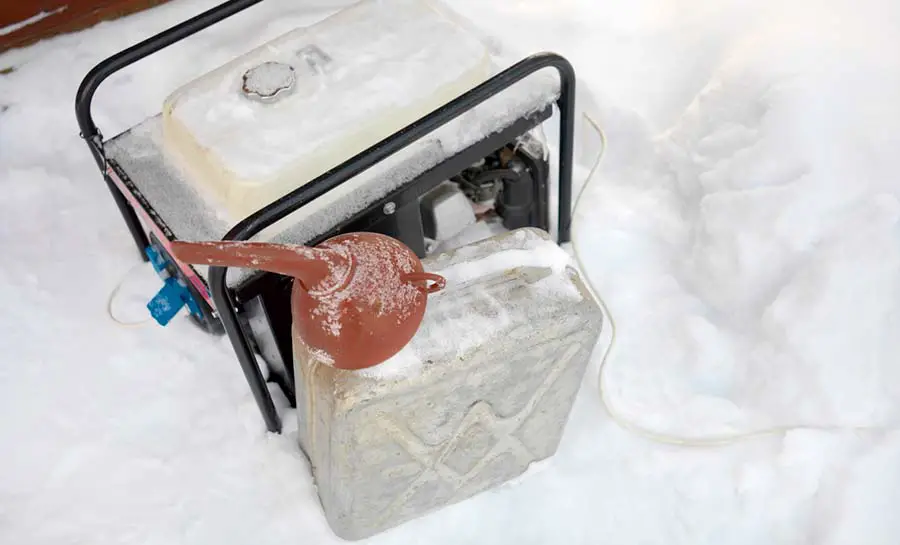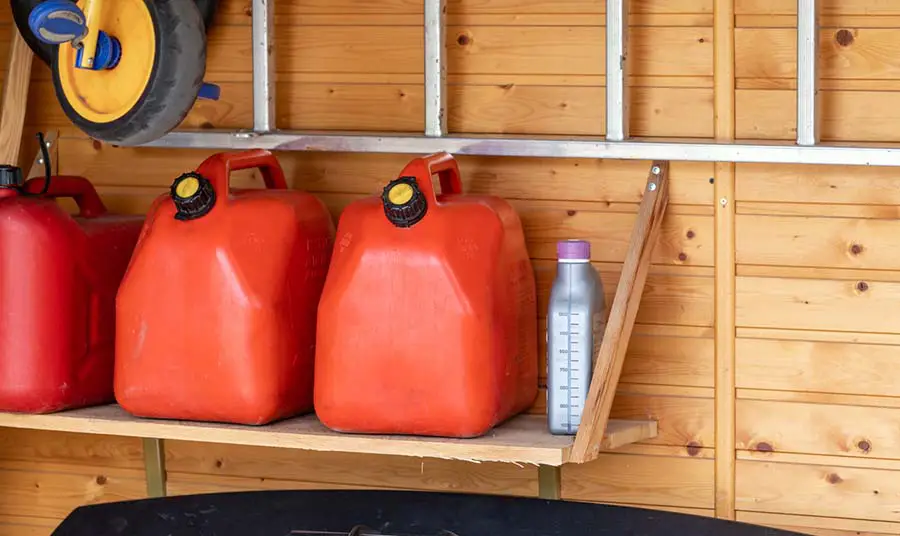
A generator is convenient to have in a home, and more Americans are acquiring generators each passing year. The problem, however, is that a generator is not something we constantly use but merely something we keep on standby and activate in emergencies. Because of this, you often store your generator out of sight; the question is, should you leave the fuel in the generator when we do this?
If you want to leave the gas in a generator for long periods, make sure to leave a 95% full tank and add a stabilizer to the fuel. Do this to minimize the chances of corrosion occurring or the fuel harming essential parts of the generator. If possible, it’s best not to store gas in a generator.
Before you leave gas in your generator, you must consider a couple of things: what happens if you do it, if anything? Are there any risks involved if you leave the gas in the generator? How long can you leave the gas in the fuel?
There are also a few things you can do if you insist on leaving the gas in your generator, and there are other places you can store your gas if you do not want it in your generator. In the paragraphs below, we explore this!
What Happens If You Leave Or Store Gas In a Generator?
The designers of generators consider that fuel will most likely sit there for some time because the idea is to have energy on standby that you can immediately use in emergency cases. Tanks that operate with diesel as fuel does face a specific problem: diesel can degrade by approximately 26% in a single month, if not more, under standard conditions.
It is best to store your generator without fuel in its gas tank when it comes to long-term storage. If you do not wish to waste fuel by simply letting your generator run, you can always transfer gasoline to your automobile. You can do this because most generators use the same gasoline that cars run on.
There are two reasons why it is best to store your generator without gas left in the tank:
- Having a generator with gasoline in can pose a great risk, and it can be a potential fire hazard.
- If the fuel in the generator’s tank is left untreated, it can potentially go bad or expire if the fuel is exposed to any of the elements.
When the gas in a fuel tank is exposed to the elements, it might not be able to power the generator the next time you wish to use it. Additionally, when you leave gasoline in the generator’s fuel tank, it can damage some of the generator’s parts. Thus, it is not ideal (nor recommended) to leave the fuel in the generator without mitigating some of the consequences that occur.
How To Minimize Damage Caused By Leaving Gas In a Generator
It is advisable to remove the fuel from your generator if you store it for long periods. Still, suppose you decide to keep the fuel in the generator for whatever reason (be it a lack of other storage or convenience). In that case, there are a couple of things you should do and keep in mind to prevent damage to the generator or fire hazards.
- Rather leave a full tank of fuel – approximately 95% full. If you decide to leave your generator with this 95% full tank of gas, make sure to fill the remaining space with a stabilizer that prevents or reduces corrosion. To ensure that this is done correctly, add a fuel stabilizer to the tank of gasoline, then run the engine for a very brief period (a couple of minutes at the most). This ensures that the stabilizer is distributed throughout the system.
- You can minimize the damage caused by keeping this gas in the fuel tank by switching off the shut-off valve.
You ensure that the gas does not settle in the generator’s fuel system by adding a stabilizer. Additionally, it will ensure that parts of the generator that can sustain damage from ethanol gasoline are protected. It is best to do this when switching the generator off for long periods or transporting the generator.
Some communities, such as ‘preppers,’ say that (in their experience) one can leave untreated stored fuel for approximately one full year (or twelve months) before it becomes unusable if you don’t add a stabilizer. This will also vary depending on the temperature of the environment in which you store the fuel.
It is also important to switch off the shut-off valve because it ensures that the chance of the carburetor needle unseating reduces significantly. The carburetor’s needle must not become unseated because it can cause fuel to enter the crankcase, diluting the engine’s oil. If this should happen, the generator’s engine can suffer a lot of damage.
Other Storage Guidelines Related To Generator Fuel
If you know that you won’t be using your generator for a while, it might be worth considering following these steps to ensure that your generator will not malfunction:
- Make sure that the carburetor float bowl has no gasoline left by draining it.
- Make sure the sediment cup’s fuel is also drained.
- It can be helpful to have the fuel tank receive a bit of ethanol fuel conditioner.
- Make sure that water condensation does not take place by filling up the fuel tank. This will ensure that all the airspace is reduced and water condensation will not take place.
- Make sure that the engine oil does not oxidize in storage by changing the engine oil before putting the generator into storage.
Where To Store Fuel If You Dont Want to Leave It In the Generator?

It is recommended that if you store the fuel, you must store it in an approved container. The container must be kept in a decently ventilated area and, preferably, some distance away from your house. This can be in an unattached garage or a shed. To ensure that the fuel lasts as long as possible, you should store it in a cool, dry place with a commercial stabilizer added to the container.
The common consensus seems to be that plastic fuel cans are an excellent method for storing fuel. You do, however, want to make sure that you keep it in an airtight place. You do this to prevent fumes from leaking out. Furthermore, you do not want to store it inside the house – instead, find a space that you don’t mind catching fire (in the worst-case scenario).
The next best place to store your fuel is, interestingly enough, your car! Yes, you read correctly. If you own a vehicle and put fuel into that car, rather store the gas you purchase at a station into one of a couple of containers you have at home. You will then use the oldest container’s gas to fuel up your car. This is called ‘fuel rotation’ by the people who do this to keep their fuel ‘fresh.’
Conclusion
In summary, it is not ideal to leave gasoline in your generator’s fuel tank, but you can if you really need to. The fuel left inside your generator can go ‘bad’ and cause problems to your generator, or might expire and not effectively power your generator the next time you start it!
If you decide to keep in the generator, make sure you consult people with the necessary expertise to advise you on which stabilizing agents you can use to add to your fuel tank. This will prolong the fuel’s life for quite some time.
If you do not want to risk a fire hazard or a damaged generator, but want to store your gas, just keep on rotating new gas into your storage containers and use the stored gas to fuel your car. If you have a car and want to make sure your gas always remains ‘fresh,’ use it!

